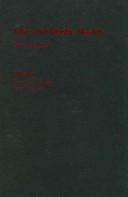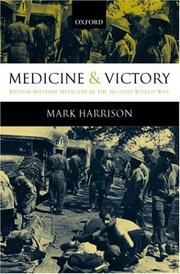| Listing 1 - 10 of 10 |
Sort by
|

ISBN: 9780195311181 9780195311273 0195311183 Year: 2008 Publisher: New York : Oxford University Press,
Abstract | Keywords | Export | Availability | Bookmark
 Loading...
Loading...Choose an application
- Reference Manager
- EndNote
- RefWorks (Direct export to RefWorks)
Public Health --- War --- War and society --- Medical aspects --- 840 Samenleving en staat --- War and society. --- Public Health. --- War. --- Medical aspects. --- Warfare --- Guerre --- Aspect médical --- Aspect social --- Medicine and war --- War and medicine --- Medicine, Military --- Society and war --- Sociology --- Civilians in war --- Sociology, Military --- Social aspects --- Warfare. --- Aspect médical. --- Aspect social. --- War - Medical aspects

ISBN: 1280841044 0191514969 1429469536 9781429469531 9780191514968 9781280841040 9780199268597 0199268592 9786610841042 6610841047 0199268592 1383041180 Year: 2004 Publisher: Oxford ; New York : Oxford University Press,
Abstract | Keywords | Export | Availability | Bookmark
 Loading...
Loading...Choose an application
- Reference Manager
- EndNote
- RefWorks (Direct export to RefWorks)
This represents the first major history of British medicine during the Second World War. It shows how medicine gave the British a crucial edge in several theatres, by preventing losses from disease and returning the sick and wounded to active service. Drawing on a wide range of official and non-official sources, the book examines medical work in all the main theatres of the war, from the front line to the base hospital. - ;Medicine and Victory is the first comprehensive account of British military medicine in the Second World War since the publication of the official history in the early 1950s
World War, 1939-1945 --- Medicine, Military --- War --- Military medicine --- Medicine --- Medicine, Naval --- Military hospitals --- Military hygiene --- European War, 1939-1945 --- Second World War, 1939-1945 --- World War 2, 1939-1945 --- World War II, 1939-1945 --- World War Two, 1939-1945 --- WW II (World War, 1939-1945) --- WWII (World War, 1939-1945) --- History, Modern --- Medicine and war --- War and medicine --- Medical care --- History --- Medical aspects. --- Medical aspects --- Relief of sick and wounded --- Medical care.
Book
ISBN: 080477370X 9780804773706 9780804758819 0804758816 Year: 2010 Publisher: Stanford, Calif.
Abstract | Keywords | Export | Availability | Bookmark
 Loading...
Loading...Choose an application
- Reference Manager
- EndNote
- RefWorks (Direct export to RefWorks)
This book examines the various mechanisms through which violent conflict undermines the health and well-being of populations.
War --- War and society. --- Public health. --- Community health --- Health services --- Hygiene, Public --- Hygiene, Social --- Public health services --- Public hygiene --- Social hygiene --- Health --- Human services --- Biosecurity --- Health literacy --- Medicine, Preventive --- National health services --- Sanitation --- Society and war --- Sociology --- Civilians in war --- Sociology, Military --- Medicine and war --- War and medicine --- Medicine, Military --- Armed conflict (War) --- Conflict, Armed (War) --- Fighting --- Hostilities --- Wars --- International relations --- Military art and science --- Peace --- Health aspects. --- Medical aspects. --- Social aspects
Book
ISBN: 9780674971721 0674971728 9780674293861 Year: 2021 Publisher: Cambridge, Massachusetts : The Belknap Press of Harvard University Press,
Abstract | Keywords | Export | Availability | Bookmark
 Loading...
Loading...Choose an application
- Reference Manager
- EndNote
- RefWorks (Direct export to RefWorks)
"Standard histories of medicine celebrate brilliant Westerners such as Florence Nightingale and John Snow. In this unorthodox telling, Jim Downs turns our focus to another key group of contributors: the subjugated peoples-forced into close quarters by enslavement and empire-whose bodies were the experimental matter on which medical progress relied"--
Epidemiology --- Slaves --- Imperialism and science --- War --- Science and imperialism --- Science --- History --- Health and hygiene --- Medical aspects --- Medicine and war --- War and medicine --- Medicine, Military --- Imperialism and science. --- History. --- Health and hygiene. --- Medical aspects. --- Enslaved persons --- Persons --- Slavery --- Diseases --- Public health --- Enslaved persons. --- Épidémiologie --- Médecine --- Esclaves --- Colonisation --- Guerres --- history. --- Histoire. --- Santé et hygiène. --- Aspect médical. --- Épidémiologie --- Médecine --- Santé et hygiène. --- Aspect médical.

ISBN: 1281242888 9786611242886 140206912X 1402069111 9048177618 Year: 2008 Volume: 41 Publisher: [New York] : Springer,
Abstract | Keywords | Export | Availability | Bookmark
 Loading...
Loading...Choose an application
- Reference Manager
- EndNote
- RefWorks (Direct export to RefWorks)
There are a range of ethical issues that confront physicians in times of war, as well as some of the uses of physicians during wars. This book presents a theoretical apparatus which undergirds those debates, namely by casting physicians as being confronted with dual-loyalties during times of war. While this theoretical apparatus has already been developed in other contexts, it has not been specifically brought to bear on the ethical conflicts that attain in wars. Arguably, wars thrust physicians into ethical conflicts insofar as these wars create a tension between a physician’s obligation to heal and an obligation to serve some other good (e.g., military chain of command, national security, the greater good, etc.). Alternatively, we can debate whether this conception is appropriate. For example, one could argue that that non-medical duties cannot attach to physicians (e.g., due to nonoverlapping spheres of justice), thus abrogating the dual-loyalty challenge. Or else one could argue that these medically-trained personnel do not act qua physicians at all (but rather partisan advocates) and therefore duties that would otherwise attach to physicians do not attach here. In the first part of this book, these issues are debated. In the second part of the book, the dual-loyalties frame is used to explore various substantive debates that obtain when the military makes use of physicians. Physician involvement in torture is a heated topic, and certainly the most visible element of the debate. Also, however, we could use the dual-loyalties framework to explore issues in other arenas, such as: development of chemical and biological weapons, medical neutrality/battlefield triage, and so on. In each of these cases, the same tensions arguably exist: physicians have duties both to their patients and “elsewhere†(which, depending on the details of the view, could be any of the above-mentioned ends).
Medicine, Military --- Military ethics. --- Medical ethics. --- War --- Moral and ethical aspects. --- Medical aspects. --- War and morals --- Medicine and war --- War and medicine --- Biomedical ethics --- Clinical ethics --- Ethics, Medical --- Health care ethics --- Medical care --- Medicine --- Bioethics --- Professional ethics --- Nursing ethics --- Social medicine --- Ethics --- Military medicine --- Medicine, Naval --- Military hospitals --- Military hygiene --- Moral and ethical aspects --- Medical aspects --- Relief of sick and wounded --- Ethics. --- Philosophy (General). --- Philosophy, general. --- Deontology --- Ethics, Primitive --- Ethology --- Moral philosophy --- Morality --- Morals --- Philosophy, Moral --- Science, Moral --- Philosophy --- Values --- Philosophy. --- Mental philosophy --- Humanities

ISBN: 0309066301 0309558239 0309528534 0585217823 9780585217826 9780309066303 0305066301 030918441X Year: 1999 Publisher: Washington, D.C. : National Academy Press,
Abstract | Keywords | Export | Availability | Bookmark
 Loading...
Loading...Choose an application
- Reference Manager
- EndNote
- RefWorks (Direct export to RefWorks)
National Center for Military Deployment Health Research (U.S.). --- Occupational Exposure --- Military Medicine --- Government Programs --- Research --- Combat Disorders --- Veterans --- Environmental Exposure --- Social Sciences --- Stress Disorders, Traumatic --- Medicine --- Science --- Persons --- Named Groups --- Health Occupations --- Anthropology, Education, Sociology and Social Phenomena --- Environmental Pollution --- Natural Science Disciplines --- Anxiety Disorders --- Mental Disorders --- Disciplines and Occupations --- Public Health --- Environment and Public Health --- Psychiatry and Psychology --- Health Care --- Military Administration --- Military & Naval Science --- Law, Politics & Government --- War --- Medical care --- Medical aspects. --- National Center for Military Deployment Health Research (U.S.) --- Medicine and war --- War and medicine --- United States. --- Medicine, Military --- Health Workforce
Book
ISBN: 3657756779 350675677X Year: 2014 Publisher: Paderborn : Verlag Ferdinand Schöningh,
Abstract | Keywords | Export | Availability | Bookmark
 Loading...
Loading...Choose an application
- Reference Manager
- EndNote
- RefWorks (Direct export to RefWorks)
Wolfgang U. Eckart, ausgewiesener Medizinhistoriker und fesselnd schreibender Chronist, legt mit seinem neuesten Werk eine faszinierende Kultur- und Sozialgeschichte der deutschen Medizin im Ersten Weltkrieg vor. Der Leser erfährt in Text und Bild, wie die Medizin als wissenschaftliche Disziplin und praktische Profession während des Krieges an der Front und in der Heimat, in Laboren und Lazaretten agierte. Das Buch schöpft aus einem reichen Fundus gedruckter und ungedruckter Quellen, die hier vielfach erstmals der Öffentlichkeit präsentiert werden. Bei weitem nicht nur der Einsatz der Sanitätsdienste unter den Bedingungen von Materialschlachten und Gaskrieg sind das Thema, sondern auch die wachsenden Probleme der Ernährungsversorgung an der Front und daheim. Hunger und Hungerrevolten motivierten Ärzte zur Entwicklung heute oftmals befremdlich erscheinender Ersatznahrung. Alkoholismus und Drogengebrauch an der Front sowie die als »spanische Influenza« zu trauriger Berühmtheit gelangte Grippewelle des Spätsommers 1918 waren weitere Phänomene, mit denen sich die Ärzteschaft konfrontiert sah. Darüber hinaus be-handeln die letzten Kapitel die unmittelbaren Folgen des Krieges in den 1920er Jahren: einerseits die Krüppel-, Versehrten- und Rententhematik und andererseits die ideologische und politische Aufarbeitung des Krieges durch die Ärztezunft.
World War, 1914-1918 --- Medicine, Military --- Soldiers --- War --- War casualties --- Medical care. --- History --- Medical care --- Medical aspects. --- Psychological aspects. --- Casualties, War --- War victims --- War wounds --- Medicine and war --- War and medicine --- Armed Forces personnel --- Members of the Armed Forces --- Military personnel --- Military service members --- Service members --- Servicemen, Military --- Armed Forces --- Military medicine --- Medicine --- Medicine, Naval --- Military hospitals --- Military hygiene --- European War, 1914-1918 --- First World War, 1914-1918 --- Great War, 1914-1918 --- World War 1, 1914-1918 --- World War I, 1914-1918 --- World War One, 1914-1918 --- WW I (World War, 1914-1918) --- WWI (World War, 1914-1918) --- History, Modern --- Casualties --- Casualties (Statistics, etc.) --- Medical aspects --- Relief of sick and wounded
Book
ISBN: 9781643138992 1643138995 Year: 2022 Publisher: New York Pegasus Books
Abstract | Keywords | Export | Availability | Bookmark
 Loading...
Loading...Choose an application
- Reference Manager
- EndNote
- RefWorks (Direct export to RefWorks)
A startling narrative revealing the impressive medical and surgical advances that quickly developed as solutions to the horrors unleashed by World War I. The Great War of 1914-1918 burst on the European scene with a brutality to mankind not yet witnessed by the civilized world. Modern warfare was no longer the stuff of chivalry and honor; it was a mutilative, deadly, and humbling exercise to wipe out the very presence of humanity. Suddenly, thousands upon thousands of maimed, beaten, and bleeding men surged into aid stations and hospitals with injuries unimaginable in their scope and destruction. Doctors scrambled to find some way to salvage not only life but limb. The Great War and the Birth of Modern Medicine provides a startling and graphic account of the efforts of teams of doctors and researchers to quickly develop medical and surgical solutions. Those problems of gas gangrene, hemorrhagic shock, gas poisoning, brain trauma, facial disfigurement, broken bones, and broken spirits flooded hospital beds, stressing caregivers and prompting medical innovations that would last far beyond the Armistice of 1918 and would eventually provide the backbone of modern medical therapy. Thomas Helling's description of events that shaped refinements of medical care is a riveting account of the ingenuity and resourcefulness of men and women to deter the total destruction of the human body and human mind. His tales of surgical daring, industrial collaboration, scientific discovery, and utter compassion provide an understanding of the horror that laid a foundation for the medical wonders of today. The marvels of resuscitation, blood transfusion, brain surgery, X-rays, and bone setting all had their beginnings on the battlefields of France. The influenza contagion in 1918 was an ominous forerunner of the frightening pandemic of 2020-2021. For anyone curious about the true terrors of war and the miracles of modern medicine, this is a must read.
World War, 1914-1918 --- War --- Medicine, Military --- Emergency medicine --- Emergency physicians --- Emergency medicine physicians --- Emergency room physicians --- Emergency medical personnel --- Physicians --- Medicine, Emergency --- Medicine --- Critical care medicine --- Disaster medicine --- Medical emergencies --- Military medicine --- Medicine, Naval --- Military hospitals --- Military hygiene --- Medicine and war --- War and medicine --- Field hospitals --- Hospital service (War) --- Hospitals, Field --- Wounded in battle --- Medical care --- Relief of sick and wounded --- Relief of sick and wounded&delete& --- History --- Medical aspects --- Armed conflict (War) --- Conflict, Armed (War) --- Fighting --- Hostilities --- Wars --- International relations --- Military art and science --- History.
Periodical
Abstract | Keywords | Export | Availability | Bookmark
 Loading...
Loading...Choose an application
- Reference Manager
- EndNote
- RefWorks (Direct export to RefWorks)
War --- Social Medicine. --- War. --- World Health. --- Medical aspects --- Medical aspects. --- Global Health --- Social Medicine --- World Health --- Wars --- Medicine, Social --- Medicine and war --- War and medicine --- Armed conflict (War) --- Conflict, Armed (War) --- Fighting --- Hostilities --- One Health --- One Health Initiative --- One Medicine Initiative --- Worldwide Health --- International Health Problems --- Health Initiative, One --- Health Problem, International --- Health Problems, International --- Health, Global --- Health, One --- Health, World --- Health, Worldwide --- Initiative, One Health --- Initiative, One Medicine --- International Health Problem --- Medicine Initiative, One --- Problem, International Health --- Problems, International Health --- Global Health. --- Warfare. --- Medicine, Military --- International relations --- Military art and science --- Peace --- Violence --- Public Health --- International Health --- Health, International --- Healths, International --- International Healths --- World Health Organization --- Armed Conflict --- Conflict, Armed --- Conflicts, Armed --- Military & Naval Medicine --- Warfare, --- Warfare --- Armed Conflicts --- Armed Conflicts.
Book
ISBN: 1784992410 1781708967 9781781708965 9781784992415 9780719090363 0719090369 9781784992422 1784992429 Year: 2016 Publisher: Manchester
Abstract | Keywords | Export | Availability | Bookmark
 Loading...
Loading...Choose an application
- Reference Manager
- EndNote
- RefWorks (Direct export to RefWorks)
Working in a world of hurt fills a significant gap in the studies of the psychological trauma wrought by war by focusing not on soldiers, but on the men and women who fought to save them in casualty clearing stations, hospitals and prison camps. Through a rich analysis of both published and unpublished personal accounts by doctors, nurses, ambulance drivers and other medical personnel from the major wars of the twentieth and early twenty-first centuries, Acton and Potter uncover a spectrum of responses to what was often unimaginable suffering, which ranged from breakdown to resilience, from exhausted resignation to firmer belief in humanity despite the brutalities of armed conflict. Organised chronologically, the book examines a broad range of writings and voices that have until now received little attention, including volunteer ambulance drivers in the First World War, POW doctors in the Second World War and medics in the Vietnam War. With a chapter dedicated to the recent narratives of medical personnel in Iraq, the study is highly topical and situates the life-writing from these contemporary wars within a larger tradition of war literature. Wide-ranging in scope and interdisciplinary in methods, Working in a world of hurt puts the letters, diaries and memoirs that chronicle physical and emotional suffering centre stage, many for the first time. These testaments to the torment of combatants also - crucially - bear witness to the harrowing struggles of wartime healers. Scholarly yet accessible, it will appeal to lecturers and students as well as the general reader.
Medicine, Military. --- World War II. --- World War I. --- Vietnam Conflict. --- Personal Narratives as Topic. --- Military Nursing. --- Iraq War, 2003-2011. --- Military Personnel --- Military Medicine. --- Medicine, Military --- Armed Forces personnel --- Members of the Armed Forces --- Military personnel --- Military service members --- Service members --- Servicemen, Military --- Armed Forces --- Anglo-American Invasion of Iraq, 2003-2011 --- Dawn, Operation New, 2010-2011 --- Gulf War II, 2003-2011 --- Iraqi Freedom, Operation, 2003-2010 --- New Dawn, Operation, 2010-2011 --- Operation Iraqi Freedom, 2003-2010 --- Operation New Dawn, 2010-2011 --- Operation Telic, 2003-2011 --- Persian Gulf War, 2003-2011 --- Telic, Operation, 2003-2011 --- War on Terrorism, 2001-2009 --- Nursing --- Military medicine --- Medicine --- Medicine, Naval --- Military hospitals --- Military hygiene --- War --- psychology. --- Medical aspects --- Relief of sick and wounded --- World War, 1914-1918 --- World War, 1939-1945 --- Vietnam War, 1961-1975 --- Iraq War, 2003-2011 --- Personal narratives. --- Vietnam Conflict, 1961-1975 --- Vietnamese Conflict, 1961-1975 --- Vietnamese War, 1961-1975 --- History --- Medicine / History of medicine --- HISTORY / Military / General. --- History of medicine. --- Psychological aspects. --- Medical aspects. --- Medicine and war --- War and medicine --- Armed conflict (War) --- Conflict, Armed (War) --- Fighting --- Hostilities --- Wars --- International relations --- Military art and science --- 20th century. --- 21st century. --- Doctors. --- Life-writing. --- Medical personnel. --- Nurses. --- Resilience. --- Trauma. --- War.
| Listing 1 - 10 of 10 |
Sort by
|

 Search
Search Feedback
Feedback About UniCat
About UniCat  Help
Help News
News